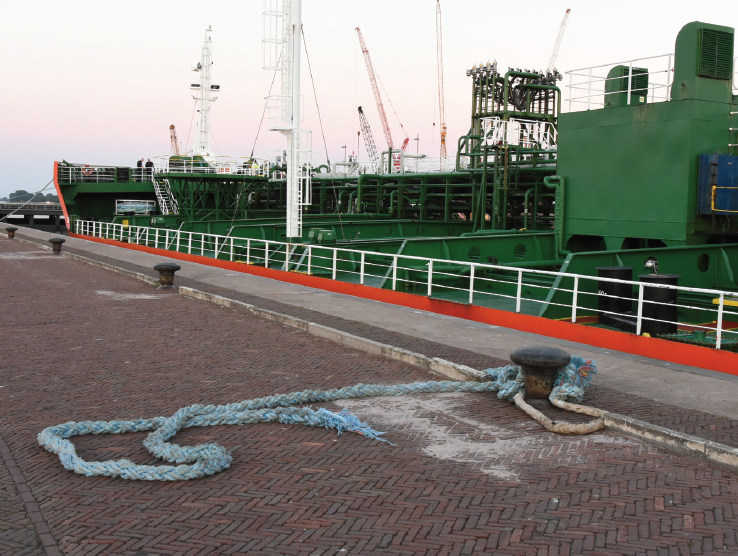Dutch Safety Board: fatality when mooring line snapped
What happened
The Dutch Safety Board has issued the following report on a mooring line fatality onboard chemical tanker RN Privodino on 28 June 2018, while entering the Noordersluis lock at Ijmuiden, en route to Amsterdam. Shortly after the port forward spring had been paid out, it unexpectedly came under severe tension. The mooring team on the foredeck was no longer able to respond adequately in good time, as a result of which the mooring line parted. The section of mooring line that was connected to the on-board winch recoiled, and struck a crew member, killing him instantly.
The full and detailed report can be found here: www.onderzoeksraad.nl/en/page/17800/fatal-outcome-following-parting-of-mooring-line—lessons-learned
What were the causes?
The Dutch Safety Board concluded that:
- The forward spring broke because, with the spring already wrapped around the bollard on shore, the vessel was still moving forward when the forward spring on the mooring line winch was transferred from the storage drum to the tension drum, at which time the forward spring could no longer be paid out quickly enough. This transfer was carried out without the relevant instructions being issued;
- The mooring team leader on the foredeck was unable to monitor the actions of the operation of the mooring line winch and was also not informed of those actions;
- The mooring team leader had no view whatsoever of the crewman. At that moment, the crewman was in a dangerous position on the foredeck, in the snap-back zone of the forward spring.
As part of the analysis of the accident, the Dutch Safety Board identified four missing or failing barriers:
- 1: Slowing down the vessel on time
- 2: Only place the spring under tension when the vessel reaches its final position in the lock
- 3: Intervention by mooring team leader (supervision)
- 4: Working outside the Snap-back zones

Lessons learned
- Bridge team management: a deep understanding of each person’s role and responsibility with respect to sharing information and issuing advice, their assigned and agreed task agreed on within the bridge team and the fulfilment of that task by other members of the bridge team;
- The accident was able to happen due to a lack of clarity and as a consequence different expectations about the final position of the vessel, in combination on the one hand with actions that were not in line with the agreement and which were not corrected, and on the other hand, insufficient mutual information exchange and advice. Acting on the basis of expectations and assumptions also played a role; [IMCA italics]
- When mooring, the vessel should be stationary in the final position when the instruction is given to tension the mooring lines. This could prevent similar accidents. That moment can only be determined by the bridge team, because the vessel is being sailed from the bridge;
- Supervisors ought not be hindered by burdening them with other tasks;
- The areas that were actually dangerous changed depending on which mooring line was used and how it was guided over the deck, so, in the sudden occurrence of a dangerous situation, it was no longer possible to rapidly determine where a safe position could be sought.
Members may wish to refer to:
- Mooring practice safety guidance for offshore vessels when alongside in ports and harbours (IMCA M 214, IMCA HSSE 029)
- In the line of fire (IMCA SEL 036, video)
- Mooring incidents (IMCA SEL 038, video)
Safety Event
Published: 19 January 2021
Download: IMCA SF 03/21
IMCA Safety Flashes
Submit a Report
IMCA Safety Flashes summarise key safety matters and incidents, allowing lessons to be more easily learnt for the benefit of all. The effectiveness of the IMCA Safety Flash system depends on Members sharing information and so avoiding repeat incidents. Please consider adding [email protected] to your internal distribution list for safety alerts or manually submitting information on incidents you consider may be relevant. All information is anonymised or sanitised, as appropriate.
IMCA’s store terms and conditions (https://www.imca-int.com/legal-notices/terms/) apply to all downloads from IMCA’s website, including this document.
IMCA makes every effort to ensure the accuracy and reliability of the data contained in the documents it publishes, but IMCA shall not be liable for any guidance and/or recommendation and/or statement herein contained. The information contained in this document does not fulfil or replace any individual’s or Member's legal, regulatory or other duties or obligations in respect of their operations. Individuals and Members remain solely responsible for the safe, lawful and proper conduct of their operations.
